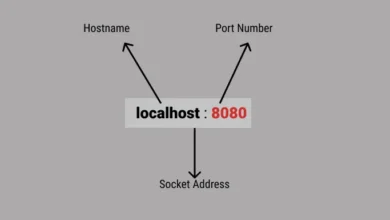Mastering Localhost: The Complete Guide to Understanding 127.0.0.1

Localhost and the IP address 127.0.0.1 are fundamental concepts in networking and web development. This guide will delve into their significance, applications Mastering Localhost best practices, helping you harness their full potential.
Introduction to Localhost
Localhost is a term that refers to the standard hostname given to the local computer. In networking, it plays a crucial role in allowing the computer to communicate with itself. This unique capability is instrumental in various stages of software and web development, Mastering Localhost enabling developers to create, test, and debug applications in a safe, isolated environment.
Understanding the basics of localhost, including its definition ,Mastering Localhost importance, and primary functions, is the first step towards leveraging its full potential in your projects.
Definition
Localhost is synonymous with the IP address 127.0.0.1, a loopback address that Mastering Localhost routes the information back to the originating computer. It is part of the IPv4 address space reserved for loopback purposes, ensuring that data packets sent to this address remain within the local machine.
Importance
The concept of localhost is pivotal in both networking and development Mastering Localhost facilitates a controlled environment where developers can run applications locally without impacting live servers or networks. This isolation is vital for testing new features, debugging issues, and ensuring the stability of software before public deployment.
Basic Functions
Localhost serves several fundamental functions:
- Running Local Servers: Allows developers to host web servers on their own machines.
- Testing Applications: Provides an environment to test software locally.
- Database Management: Enables local database setup and management.
- Network Configuration: Helps in configuring and testing network setups without external interference.
Understanding 127.0.0.1
The IP address 127.0.0.1 is integral to the functionality of localhost. Mastering Localhost Often referred to as the loopback address, it ensures that data sent from the computer is directed back to itself, bypassing any network interfaces.
IP Address
127.0.0.1 belongs to the IPv4 range reserved for loopback addresses, spanning from 127.0.0.0 to 127.255.255.255. This range is designated exclusively for local communications within the host system.
Loopback Mechanism
The loopback mechanism facilitated by 127.0.0.1 is crucial for local networking. When a system uses this address, it effectively short-circuits the network stack, sending data back to the source without traversing any physical network.
Common Uses
The loopback address is widely used for:
- Testing Network Applications: Developers can test network applications locally without external connections.
- Running Local Services: Hosting services like web servers, databases, and APIs.
- Debugging and Troubleshooting: Identifying and fixing issues in a controlled environment.
Setting Up Localhost
Setting up localhost involves configuring your computer to run as a local server. This process varies slightly depending on the operating system but generally includes similar steps.
Required Software
To set up localhost, you need specific software depending on your development needs:
- Web Server: Apache, Nginx, or Microsoft IIS.
- Database Management Systems: MySQL, PostgreSQL, SQLite.
- Programming Language Runtimes: PHP, Python, Ruby, Node.js.
Installation Steps
- Install a Web Server: Download and install a web server like Apache or Nginx.
- Configure the Server: Edit configuration files to set up the local environment.
- Install Database Systems: Set up a local database server if needed.
- Install Programming Languages: Ensure you have the necessary runtimes for your development stack.
Initial Configuration
After installation, initial configuration involves setting up:
- Root Directory: Where your web files will be stored.
- Server Settings: Adjusting configuration files for optimal performance.
- Permissions: Ensuring the server has the necessary permissions to read and write files.
Common Use Cases of Localhost
Localhost is employed in a variety of scenarios, each leveraging its unique ability to simulate a networked environment without leaving the local machine.
Web Development
Localhost is a staple in web development. It allows developers to host websites and web applications locally, making it easier to test changes and debug issues before deploying to a live server.
Testing Environments
Developers can create isolated testing environments using localhost. This ensures that testing does not interfere with production systems and allows for thorough examination of new features.
Database Management
Local databases can be managed and tested via localhost, facilitating secure and efficient development of database-driven applications.
Benefits of Using Localhost
Using localhost offers several advantages, making it a preferred choice for developers and IT professionals.
Security
By keeping development and testing local, you minimize exposure to external threats. This enhances security during the development phase, as sensitive information remains confined to your machine.
Performance
Local environments typically perform better than remote servers due to reduced latency and immediate feedback. This accelerates development and testing processes.
Flexibility
Localhost provides immense flexibility, allowing you to configure your environment precisely to your needs. You can easily switch between different setups and configurations without affecting other systems.
Localhost vs. Public Server
Understanding the differences between localhost and public servers is essential for making informed decisions about where to develop and host your applications.
Key Differences
- Accessibility: Localhost is accessible only from the local machine, while public servers are accessible from anywhere with an internet connection.
- Security: Localhost is inherently more secure during development, as it is isolated from the external network.
- Performance: Localhost offers faster performance for development and testing, whereas public servers are optimized for handling multiple concurrent users.
Pros and Cons
Localhost Pros:
- Enhanced security for development.
- Better performance for testing.
- Full control over the environment.
Localhost Cons:
- Limited accessibility.
- Not suitable for live applications.
Public Server Pros:
- Accessible from anywhere.
- Suitable for live deployments.
Public Server Cons:
- Greater security risks.
- Higher latency compared to localhost.
Troubleshooting Localhost Issues
Despite its benefits, localhost can encounter issues. Knowing how to troubleshoot these problems is vital for maintaining a smooth development workflow.
Common Problems
- Port Conflicts: Another application using the same port.
- Configuration Errors: Incorrect settings in configuration files.
- Permission Issues: Insufficient permissions to access files or directories.
- Software Conflicts: Incompatibilities between installed software.
Diagnostic Tools
Several tools can help diagnose localhost issues:
- netstat: Displays network connections and port usage.
- ping: Checks connectivity to localhost.
- telnet: Tests connectivity to specific ports.
Solutions
- Change Ports: Assign a different port if conflicts arise.
- Review Configurations: Ensure all configuration files are correctly set.
- Adjust Permissions: Update file and directory permissions as needed.
- Reinstall Software: Address software conflicts by reinstalling or updating problematic applications.
Localhost Security Best Practices
Ensuring the security of your localhost environment is crucial, especially when handling sensitive data during development.
Protecting Your System
- Use Firewalls: Configure firewalls to restrict access to localhost services.
- Regular Updates: Keep your software and operating system updated to mitigate vulnerabilities.
- Strong Passwords: Use strong passwords for any services running on localhost.
Common Vulnerabilities
- Open Ports: Unnecessarily open ports can be exploited.
- Weak Configurations: Poorly configured services may expose your system to attacks.
- Outdated Software: Old software versions may have known security flaws.
Mitigation Strategies
- Close Unused Ports: Only keep necessary ports open.
- Secure Configurations: Follow best practices for configuring services securely.
- Update Regularly: Ensure all software is up to date.
Advanced Localhost Configurations
For more advanced use cases, localhost can be configured in various ways to optimize performance and functionality.
Custom Hosts
You can define custom hostnames in your system’s hosts file, mapping them to 127.0.0.1 for easier access to different projects.
Virtual Hosts
Virtual hosts allow you to run multiple sites on a single server. Configure your web server to recognize different domains and serve the appropriate content.
Port Forwarding
Port forwarding can be set up to allow external access to specific localhost services, useful for collaborative development and testing.
Working with Databases on Localhost
Local databases are a critical part of development environments, enabling efficient data management and testing.
MySQL
MySQL is a popular choice for local development due to its reliability and extensive features. Install and configure MySQL to start managing databases locally.
PostgreSQL
PostgreSQL offers advanced features and is ideal for more complex database requirements. Set up PostgreSQL to leverage its capabilities in your local environment.
SQLite
SQLite is a lightweight database engine perfect for small projects. Its simplicity and ease of use make it a go-to for quick setups and testing.
Running Applications on Localhost
Localhost supports running a variety of applications, from web servers to development frameworks.
Web Servers
Install web servers like Apache or Nginx to host your web applications locally. Configure them to match your production environment for accurate testing.
Development Frameworks
Frameworks like Django, Rails, and Express can be run on localhost to develop and test applications. Set up these frameworks to streamline your development workflow.
Testing Tools
Utilize testing tools like Selenium and Postman on localhost to automate testing processes and ensure the reliability of your applications.
Localhost in Different Operating Systems
Setting up localhost varies across different operating systems, each with its own procedures and tools.
Windows
Windows users can set up localhost using tools like XAMPP or WampServer, which bundle web servers, databases, and scripting languages in a single package.
macOS
macOS provides built-in support for web servers and databases. Tools like MAMP and Homebrew simplify the setup process.
Linux
Linux offers robust support for localhost configurations, with tools like LAMP stack (Linux, Apache, MySQL, PHP) providing a comprehensive development environment.
Using Localhost for API Development
Developing APIs locally allows for efficient testing and debugging without impacting live systems.
Local APIs
Create and test local APIs using frameworks like Flask, Express, or ASP.NET. This setup ensures a controlled environment for development.
Testing
Utilize tools like Postman to test API endpoints, ensuring they function correctly before deployment.
Debugging
Local environments make debugging APIs easier, allowing you to trace issues and fix them promptly.
Localhost and Networking Protocols
Understanding how localhost interacts with different networking protocols is essential for developing robust applications.
HTTP/HTTPS
Host secure web applications locally using HTTP/HTTPS. Configure your web server to handle HTTPS for secure communication.
TCP/IP
TCP/IP protocols are fundamental to network communication. Localhost utilizes these protocols for reliable data transfer within the local machine.
UDP
UDP protocols, used for low-latency communication, can also be tested locally. Configure applications to use UDP for scenarios where speed is critical.
Simulating Network Conditions on Localhost
Simulating different network conditions can help test the robustness of your applications under various scenarios.
Latency
Introduce artificial latency to simulate slow network conditions. Tools like Clumsy or Network Link Conditioner can help with this.
Packet Loss
Simulate packet loss to test how your application handles unreliable network conditions. This is crucial for developing resilient applications.
Bandwidth Throttling
Throttling bandwidth helps test performance under constrained network conditions. Use tools like Charles Proxy to control bandwidth during testing.
Integrating Localhost with Cloud Services
Integrating localhost with cloud services can create powerful hybrid development environments.
Hybrid Environments
Combine local development with cloud resources for a flexible and scalable setup. This approach allows for local testing with seamless cloud integration.
Data Sync
Synchronize data between localhost and cloud databases to ensure consistency and facilitate testing in both environments.
Deployment Strategies
Develop locally and deploy to the cloud seamlessly. Tools like Docker and Kubernetes can streamline this process, enabling efficient deployment.
Localhost for Mobile Development
Localhost can also be used for mobile development, providing a controlled environment for testing mobile applications.
Emulators
Use emulators like Android Studio or Xcode to run and test mobile applications locally. This setup helps identify issues early in the development process.
Simulators
Simulators offer a way to test mobile applications without needing physical devices. They are useful for quickly verifying functionality during development.
Real Device Testing
For more accurate testing, use real devices connected to your localhost environment. This approach ensures that applications perform well on actual hardware.
Localhost and Containerization
Containerization technologies like Docker and Kubernetes are revolutionizing local development environments.
Docker
Docker allows you to create isolated containers for your applications, ensuring consistency across different environments. Use Docker to set up and manage local containers.
Kubernetes
Kubernetes provides advanced orchestration for containerized applications. Use it to manage complex local development setups with ease.
Benefits for Development
Containerization simplifies dependency management, enhances reproducibility, and streamlines the development workflow.
Frequently Asked Questions about Localhost
What is localhost? Localhost refers to the local machine’s hostname, commonly associated with the IP address 127.0.0.1, used for local networking and development.
Why is 127.0.0.1 called the loopback address? 127.0.0.1 is called the loopback address because it routes network traffic back to the same machine, enabling local communication without external network access.
How do I set up a localhost server? Setting up a localhost server involves installing a web server (like Apache or Nginx), configuring it, and setting up any necessary databases or programming language runtimes.
Can I use localhost for testing APIs? Yes, localhost is ideal for developing and testing APIs in a controlled environment before deploying them to live servers.
What are the security implications of using localhost? Localhost provides a secure environment for development, but it is essential to follow best practices like closing unused ports and keeping software updated to mitigate potential vulnerabilities.
How can I troubleshoot localhost issues? Troubleshoot localhost issues by checking for port conflicts, reviewing configuration files, adjusting permissions, and using diagnostic tools like netstat and ping.
Conclusion
Localhost and the loopback address 127.0.0.1 are indispensable tools in the toolkit of any developer or IT professional. From setting up local servers and testing environments to ensuring security and performance, understanding and leveraging localhost can significantly enhance your development workflow. By following best practices and exploring advanced configurations, you can unlock the full potential of localhost in your projects.



